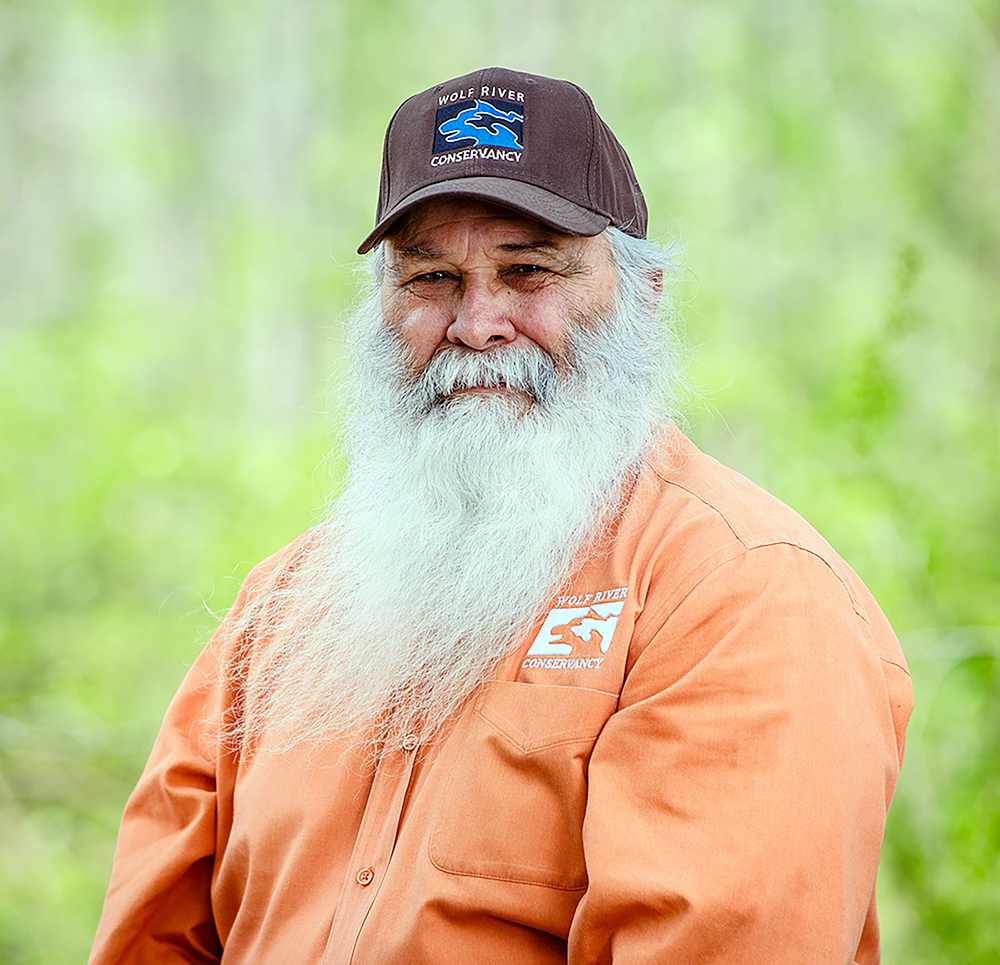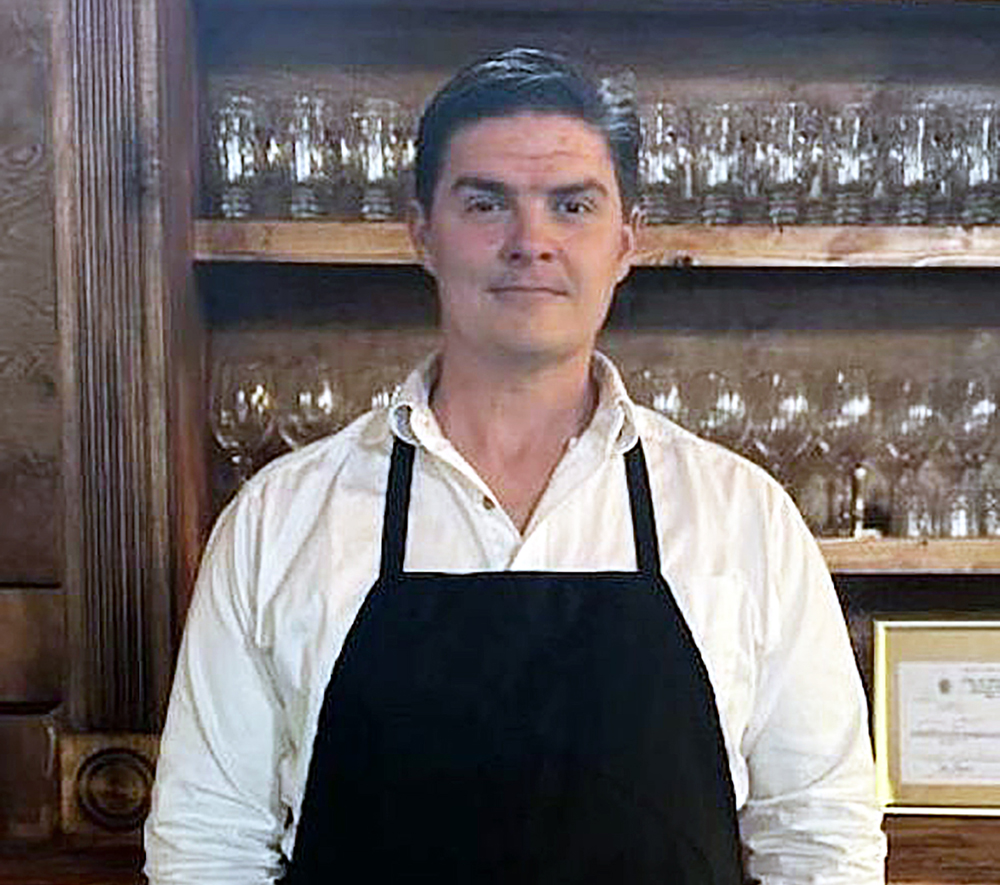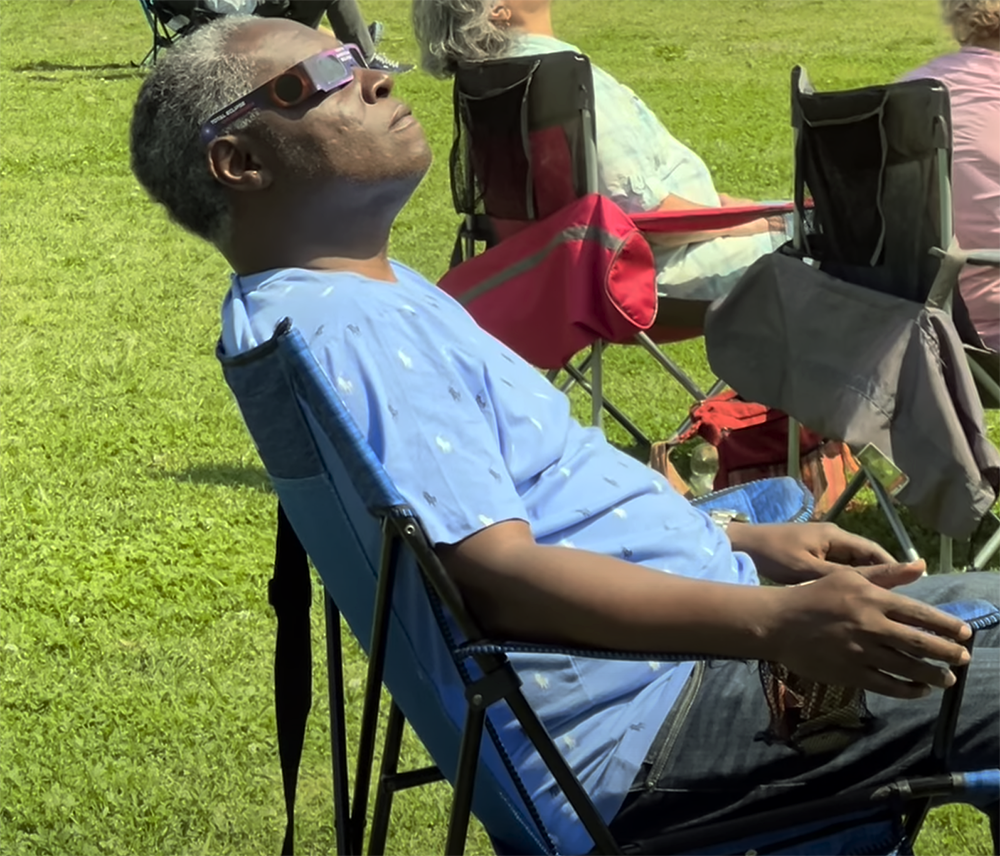Huge cypress trees rise from placid waters of the Wolf River, moss clinging to their trunks. This land where the Wolf’s channels widen and the flow slows in Fayette County is called the Ghost River. It is one of West Tennessee’s most beautiful natural wonders.
Jim Gafford knows the magic of the Ghost River. As recreation coordinator for the Wolf River Conservancy (WRC), he leads paddling trips on the first Saturday of every month along different sections of the 100-mile-long Wolf. “The water is a natural element to everybody. If you get on the water, it supports you, it relaxes you, it has a calming effect on you,” he says.

Nowadays, the Ghost River is a Class I Scenic-Recreational State Natural Area. But it wasn’t always like that. It’s hard to believe that, as recently as 1995, the ancient wetland was almost destroyed. “The Conservancy was founded in ’86,” Gafford says. “In the mid-’90s, we found out that Peter Beasley had sold the Beasley Plantation to a development company. The development company actually published plans to go in and harvest all of the cypress and all the usable timber in the bottom land, and then sell off the land into what they called ‘farms’ — they were just narrow strips of land with river access that would have no restrictive covenants at all. So people could have purchased the land and done what they wanted to with it and just have a little access to the river. Our first conservation effort was to save that 4,000 acres from development. Fortunately, we were able to, and we’re still using it now. It’ll be here for thousands of years and allowed to evolve naturally.”
After that first victory almost 30 years ago, the WRC has continued their mission of protecting the waters of the Wolf and making sure they’re available to everyone. But not all wetlands have the Ghost River’s rizz. Most of Tennessee’s approximately 787,0000 acres of wetlands are swamps, bayous, and muddy creek beds, tucked away in neglected corners of farms or undeveloped land on the edges of suburbs. But that does not mean wetlands are not valuable, says Sarah Houston, executive director of Protect Our Aquifer. In flood-prone West Tennessee, wetlands act as a buffer against too much rain. Less wetland acreage means more and bigger floods.

“Wetlands really do us a big favor in absorbing floodwater, holding on to it,” Houston says. “And that water is either going to be slowly released into surface water or it’s going to be slowly released into groundwater. … Housing developments get built in what used to be wetlands or downstream near floodplains, and then they see regular flooding. Those developments probably should have never been approved in those places because the water is gonna keep flowing. Now, it’s just flowing into your house.”
Wetlands also play an important role in mitigating climate change. The trees, plants, and mosses in swamps and bayous absorb carbon dioxide, the buildup of which causes global warming, from the atmosphere. In a regular forest, when the leaves fall and the trunks die, their decomposition can release methane, an even more potent greenhouse gas, into the air. Or they can burn, throwing soot and carbon dioxide high into the atmosphere. But in swampy areas, organic debris falls into the water and is buried in sediment, where it cannot contribute to global warming. Much of the coal and oil we burn today was formed from remains of wetlands buried during the Permian period 290 million years ago.
As wetlands are drained, developed, or paved, they lose the ability to sequester carbon, and some of the stored carbon dioxide and methane is re-released into the atmosphere. A 2016 paper by A.M. Nahlik and M. S. Fennessey, published in the journal Nature, found that “wetland soils contain some of the highest stores of soil carbon in the biosphere.” In some cases, up to 40 percent of wetland soil was carbon, compared to the 0.5 to 2.0 percent found in agricultural soils. The study found that freshwater wetlands were much more efficient at storing carbon than river deltas or saltwater estuaries. All told, the study estimated that the continental United States’ wetlands contain a whopping 11.52 gigatons of sequestered carbon.
Gafford says West Tennessee’s wetlands are valuable in another way. “In the Memphis, Shelby County, Fayette County, Tipton County area, the most important value of that swampy area is what percolates down and actually recharges our water supply. If you talk to any expert, they’ll tell you that Memphis has the best water in the world.”
Houston’s organization, Protect Our Aquifer, watches over that valuable resource. Memphis is built over an underground aquifer containing as much freshwater as one of the Great Lakes. “It is our sole source of drinking water in Memphis, Tennessee,” she says. “It’s also all the water that industry and farmers use, too. It is one of the purest sources of water in the country, and it just happens to be right below our feet, easily accessible. Because of the way it was formed, over millions of years back when this area was actually a shallow ocean, the Gulf of Mexico, and through a series of deposits of gneiss, quartz sand, and then thick clay layers, it created what we now call the Mississippi embayment. The majority of the water that’s actually below Memphis in the Memphis sand aquifer fell as rain 2,000 years ago, and has been infiltrating and filtering slowly over time to bring us that pure drinking water. And it is all out of sight, out of mind.”

What Is a Wetland?
The Environmental Protection Agency (EPA) defines wetlands as “areas where water covers the soil, or is present either at or near the surface of the soil all year, or for varying periods of time during the year.”
That’s a broad definition that has been more or less enforced since the passage of 1972 Clean Water Act. Federal protections for wetlands were expanded during the Obama administration, and then rolled back during the Trump administration. Then, in May 2023, a 5-4 Supreme Court ruling in the case of Sackett vs. EPA forced the agency to limit its jurisdiction to only wetlands that have “continuous surface connection to bodies that are Waters of the United States.”
“If you can get a boat on it, it’s a ‘Water of the United States,’” says Houston. “If you can’t, then that’s not a federal government issue. What changed was this whole definition of technically isolated wetlands, where they’re not directly next to a stream.”
The ruling removed approximately 63 percent of wetlands from federal protection, including most ephemeral wetlands. The rollback alarmed wetlands fans like Gafford. “The results of the EPA and the wetlands protection acts have been so effective, I don’t think that we need to do anything at all to loosen those restrictions,” he says. “Because of agriculture practices and building practices, we let the water get pretty bad, just from the runoff. It was deemed appropriate to put those protections in place, and I think we need to adhere to them because the results have been, in my mind, fantastic.”
The state of Tennessee has defined protected wetlands even more strictly than the federal government since the 1970s. “The Supreme Court justices actually noted that this should be a state-level regulation because states differ so much in their water resources and their landscapes,” says Houston.
After Sackett v. EPA, Rep. Kevin Vaughan (R-Collierville) introduced HB 1054, a bill which proposed to bring the state’s definition of a wetland in line with the new federal rules. According to a January, 2024 report by the Tennessee General Assembly Fiscal Review Committee, adoption of the bill would result in a 55 percent decrease in the amount of currently protected wetlands, or approximately 432.850 acres of the states’ 787,000 acres of wetlands.
Vaughan is a real estate broker and owner of Township Development Services, which offers site selection, land planning and management, and government relations services to developers. In February, he told a legislative committee, “It’s your property, but a third party is going to tell you if you can use it. And if you can’t use it, then you have to pay another party money for you to be able to use your property. That’s the origins of where this bill came from.”
Houston says, “The main argument was too much bureaucracy and red tape, and there is some validity to the concerns of the sponsor Chairman Vaughan. Sometimes, small wetlands that might have kind of sprung up require a permit, and it can add additional cost [to development] because with our wetlands regulations, you have to get a permit if you’re gonna damage them or remove them, and then you have to pay into a mitigation bank.”
The BlueOval Factor
Much of the wetland acreage which would lose protection under the bill is in West Tennessee. That includes Haywood County, where the new Ford BlueOval City is currently under construction. The $6 billion facility to produce electric vehicles and batteries is the largest single investment in Tennessee history. Houston calls the area “ground zero for this development pressure. … Haywood County is seeing tremendous growth. They’re getting permit application after permit application for these new developments. That is also the county that has the highest number of wetlands in the state. … Originally, the argument was, ‘These muddy tracts with some sprouts in them are being classified as wetlands, but they’re not and we need to get rid of them.’ Then it became more about the pressure for growth and the timeline that we’re on. Getting rid of these wetlands in big tracts, acres and acres at a time, would speed up the opportunity for development to occur right now, especially in West Tennessee.”
The potential impacts of wetland development would go farther than just BlueOval City. “We know that there are connections to the aquifer in that area,” says Houston. “The wells that have been drilled for the [BlueOval] megasite are in the unconfined part, so they’re in the recharge zone of the aquifer. And we know that band of the recharge zone extends into half of Haywood County and pretty much all of Fayette County.”
A big unknown is exactly how much of a role wetlands play in recharging the aquifer. It was long thought that water seeped through the soil in a relatively uniform manner, but recent studies in North Mississippi suggest that most of the recharging occurs in relatively small areas where the Memphis Sands are near the surface. The science remains uncertain, but as the POA puts it in a report distributed to legislators, “It’s not necessarily the type or size of wetlands, but the location that determines how valuable it is to recharge.”
Pushback
Once the stakes of HB 1054 became clear, environmental advocates mobilized against it. “To me, wetland preservation represents one of our state’s most vulnerable natural ecosystems at this moment. Wetlands provide a safe haven for our country’s wildlife and serve as a crucial space for aquifer recharge. The preservation of our wetlands serves as a litmus test for the well-being of our environment,” says Memphis Community Against Pollution President KeShaun Pearson.
The bill’s proponents were also mobilized. Adam Friedman of Tennessee Lookout recently reported on Build Tennessee, a political action committee formed in July 2022 by 18 owners and partners in real estate and construction companies, including Keith Grant, a Collierville developer and the former president of the West Tennessee Home Builders Association. In less than two years of existence, the PAC became the fourth-largest spender on lobbying in Tennessee and donated to 90 lawmakers of both parties.
Protect Our Aquifer led the charge against the bill. “We don’t do a lot at the state level,” says Houston. “So we were planning on playing a supportive role in this. But since the majority of the wetlands were in West Tennessee, our mission is all about protecting the drinking water supply that happens to be underneath all of West Tennessee, and the majority of the House subcommittee members represented West Tennessee, we kind of got shoved into the forefront.”
The activists found allies on Capitol Hill. “I think it’s an abhorrent bill that is bad for our state,” says Rep. Justin J. Pearson (D-Memphis). “It’s bad for our environment, and it is showing the influence of private corporations and entities and developers in our Tennessee legislature. It’s bad for democracy when elected leaders are literally carrying legislation for private companies and developers to the detriment of 7 million people’s environment. And as a person who cares deeply about environmental justice, I think this is a complete affront to the causes, the beliefs, the values that many of us share, Republicans and Democrats, people who are progressive and people who are conservative.”
Houston says they were open to revisiting Tennessee’s strict wetlands definitions. “Right now, any type of wetland is considered the same value. But in reality, there are some wetlands that are much higher quality. They’ve got no invasive species. They’re nice and healthy, and haven’t been trampled on by humans. A middle ground we want to find is, how do we categorize wetlands in the state based on low, moderate, and high values that could then determine how much mitigation credits are required, what really needs to be permitted, and what is okay with being removed.”
Houston says when the bill was first introduced in 2023, “it was put on hold because TDEC [Tennessee Department of Environment and Conservation] promised that there would be stakeholder meetings to draft a good bill that everyone could agree upon that would create new categories for wetlands and address some of this red tape bureaucracy issue. Well, those stakeholder meetings never really happened in earnest last year.”
A Temporary Victory
Houston and the POA testified in front of both Senate and House committees who were considering the bill. “Our information was really well received,” she says. “No matter where you live in West Tennessee, you have a pretty high regard for our aquifer and the drinking water supply.
“In early March, when the Senate committee heard the bill, the senators on that committee said, ‘Trying to categorize wetlands and create all these new definitions is a really complex process. We’re not gonna get it right this first try. So let’s move this to summer study and actually have the stakeholder meetings.’ Commissioner David Sellers, on record, promised to have the stakeholder meetings. So they, 6 to 2, voted it to summer study. We were like, ‘Holy smokes! We won! It’s dead!’ But then Chairman Vaughan in the House kept pushing the bill despite it being dead on the Senate side, which you don’t really see that.”
Pearson says, “Kevin [Vaughan]’s only aim is to open up more land for development with fewer regulations, especially around BlueOval, and over any potential objections from community members in majority-Black Haywood County or other areas that could be exploited by developers, with building happening that does not take into account environmental justice. … We know environmental justice and racial justice oftentimes coexist and you cannot have one without the other.”
As this legislative session winds down towards an expected late April adjournment, Pearson says he is wary. “It is not likely that this legislation will move forward this session. However, due to [Governor Bill Lee’s school] voucher bill also being sought to be passed by this General Assembly, it may become a bargaining chip for Kevin Vaughan and the Republicans to use to try and get it passed for his vote on the voucher bill. The reason I say that is, a number of Republicans have come out vehemently against the governor’s bill, and they’re operating on a very thin majority when it comes to the passage of that legislation, which is the governor’s signature legislation for this General Assembly. That’s why we must continue to pay attention and be engaged in this process because anything is still possible. I have seen how racism and white supremacy and capitalistic exploitation works here, and if you trust the process too much, then you will likely be duped by it because they don’t care too much about the process here.”
During the final week of committee meetings, HB 1054 was not reconsidered, much to the relief of activists like Houston. “Officially, the wetlands 2024 legislative session saga is over, and there will be a summer study this year to dig into the details and try to refine what our wetland protection laws can look like,” she says. “It’s good news. There’s still work to do, but there is good news.”
In the interest of transparency, we note that the Memphis Flyer is owned by Contemporary Media, Inc., whose board chairman, Ward Archer Jr., also founded Protect Our Aquifer. This reporting was conducted independently and relies on multiple sources.











